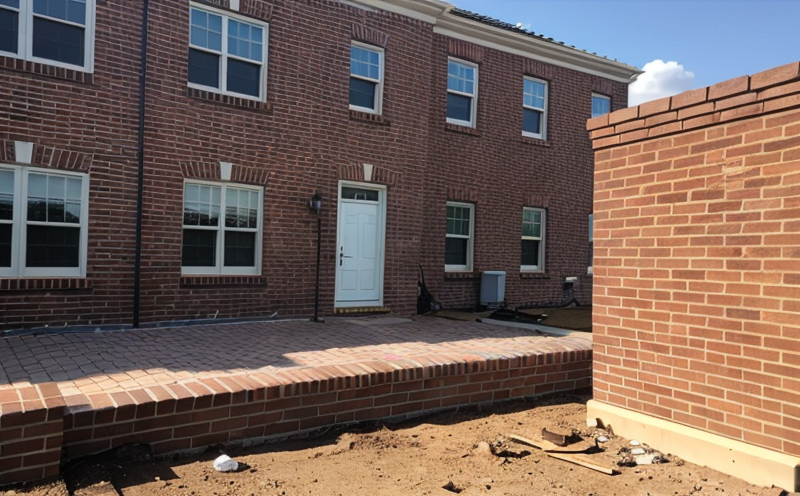EN 772 Brick Density and Dimensions Measurement
The European Standard EN 772 specifies methods of testing bricks to ensure they meet the required performance standards. This service focuses on measuring brick density and dimensions according to this standard, which is critical for ensuring quality in building & infrastructure projects.
EN 772-1 provides guidance on how to measure the mass per unit volume (density) of individual bricks using various techniques. It also includes methods for determining the average dimensions of a batch of bricks. These measurements are essential because they directly impact the structural integrity and thermal performance of buildings and infrastructure projects.
Brick density is particularly important as it affects the weight distribution within walls, which in turn influences the overall stability and load-bearing capacity of structures. Bricks that do not meet specified density levels may compromise these critical aspects. Similarly, precise determination of brick dimensions ensures compatibility with design specifications and reduces the risk of masonry failures.
During testing, each brick undergoes a series of steps to ensure accuracy:
- The bricks are cleaned thoroughly to remove any dirt or debris that might affect measurement results.
- A representative sample is selected from the batch being tested.
- The mass of each individual brick is measured using an accurate balance.
- The dimensions (length, width, and height) are recorded with millimeter precision using a micrometer gauge.
- The density calculation involves dividing the mass by the volume derived from the dimensions.
Testing must be conducted in controlled environmental conditions to ensure consistent results. The laboratory follows stringent protocols to maintain accuracy and reliability, aligning with international standards such as EN 772-1. This ensures that every test meets rigorous quality control criteria necessary for compliance with building codes.
The results of these tests are used by architects, engineers, and construction professionals to make informed decisions about material selection and project design. Ensuring that bricks meet the specified density and dimension requirements is crucial for the longevity and safety of buildings and infrastructure projects.
By adhering strictly to EN 772-1 guidelines, we guarantee accurate and reliable measurements that contribute significantly to the overall quality assurance process in construction. This service plays a pivotal role in maintaining high standards across various sectors including residential development, commercial real estate, public works, and industrial facilities.
Why It Matters
The importance of accurate brick density and dimension measurements cannot be overstated. Inadequate or inconsistent materials can lead to structural weaknesses that compromise the safety and durability of buildings and infrastructure projects. Ensuring compliance with EN 772-1 helps eliminate such risks, providing peace of mind for all involved parties.
From a regulatory standpoint, meeting these standards is mandatory in many regions, particularly those adhering strictly to European Union directives. Failure to comply can result in delays or even project cancellations, leading to significant financial losses for developers and constructors.
For quality managers and compliance officers, this service offers a critical tool for maintaining high standards within their operations. By leveraging the precision of EN 772-1 testing, they can ensure that all materials used meet stringent specifications, thereby enhancing product integrity across multiple projects.
R&D engineers benefit from these tests as well, as they provide valuable data for ongoing improvement efforts related to material science and engineering practices. Understanding how different factors influence brick properties allows for more innovative and effective solutions in future designs.
Procurement teams can also utilize the results of this testing during sourcing processes, helping them identify reliable suppliers who consistently deliver high-quality materials. This ensures that only reputable vendors are selected, further enhancing project outcomes.
Eurolab Advantages
At Eurolab, our commitment to excellence in every aspect of laboratory testing sets us apart as the premier choice for EN 772 brick density and dimensions measurement services. Our advanced facilities, equipped with state-of-the-art instruments, ensure accurate and reliable results that are consistently reproducible.
We employ highly skilled technicians who possess extensive experience in performing these tests according to strict protocols outlined by EN 772-1. Their expertise guarantees that no detail is overlooked during the testing process.
Our laboratories operate under ISO/IEC 17025 accreditation, ensuring compliance with internationally recognized standards for proficiency and reliability. This accreditation speaks volumes about our dedication to delivering top-tier laboratory services.
We offer expedited turnaround times without compromising on quality, allowing clients to receive their test results promptly so they can proceed confidently with subsequent phases of their projects.
Our comprehensive reporting capabilities provide detailed insights into the tested samples, facilitating easy interpretation and application in various contexts. Whether it's for internal documentation purposes or external compliance requirements, our reports are tailored specifically to meet individual needs.
International Acceptance and Recognition
EN 772-1 is widely recognized across Europe as a key standard for brick testing. Its principles have been adopted by numerous countries within the European Economic Area (EEA), reflecting its importance in ensuring consistent quality.
The United Kingdom, Ireland, and other member states of the European Union actively use this standard when specifying materials for construction projects. Compliance with EN 772-1 is often a prerequisite for international trade, making it essential for businesses operating globally.
Other regions outside Europe have also shown interest in adopting similar standards due to their effectiveness and reliability. For instance, some Middle Eastern countries have begun integrating EN 772 principles into local building codes.
Asian markets such as Japan and South Korea are increasingly looking towards internationally recognized testing methods like those outlined by EN 772-1 for quality assurance in their construction industries.
The universal acceptance of this standard underscores its significance in the global building & infrastructure sector. By adhering to these globally recognized guidelines, constructors can ensure that their projects meet international standards, enhancing their credibility and marketability.





